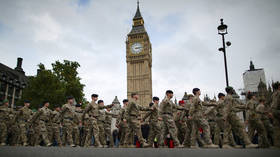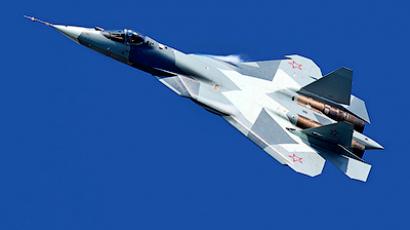‘Aircraft carrier killer’: RT goes aboard flagship Varyag
The Varyag guided missile cruiser knows no fear – not even the old one about having women aboard. RT’s female reporter admires the might of the Pacific flagship, samples sea bread, looks into the hearts of its crew, and meets the ship’s cats.
His wide green eyes were studying me. I was studying him, too. It just seemed too strange. A red cat with a sly face – it really was sly – was lying by the ship’s gun. It then stretched itself, yawned as if we were no longer of any interest, and slowly walked away.“Madame, look sharp! It’s a warship, please do get inside,” a loud voice from behind brought me back to reality. I was standing aboard the Varyag missile cruiser, the flagship of the Pacific Fleet, which has been aptly dubbed the ‘aircraft carrier killer.’I looked up to see the killer’s main weapon – the Vulkan complex, or ‘Volcano’. It was so huge it seemed it occupied half of the ship, with eight gun muzzles deployed on each side. On the way to the cabin, I was told that the Vulkan spews 5-tonne cruise missiles approaching its target at a speed of 3,000 km per hour. After the launch, the missiles unfold their wings and draw up into a group, a wolves’ pack, with a leader – a lone missile flying separately. If it’s detected and targeted, it will activate a system of active interference to confuse the enemy’s missile. It picks the target independently, in close proximity to the group of enemy ships, identifies the largest one and directs one of the subordinate missiles into it. The rest attack other ships. If the leader is shot down, it’s replaced by another missile.“Right,” I stopped short. “But it’s not going to fire today, is it?” I asked apprehensively. I have a vivid imagination and could all too easily conjure up the scene on the ship when the missiles burst from their muzzles. It’s a spectacular sight, of course, but best viewed from a couple of hundred kilometers away,through binoculars. Ideally, I would watch it on YouTube. I wanted to return home physically and psychologically sound.
“There’s nothing to worry about, casualties during exercises like this are under two per cent of the staff. That’s the average,” our cameraman tried to calm me down. Only yesterday, I would have laughed at the joke but after today’s land exercises I had lost my sense of humor. The plan was for sea-borne troops from Vladivostok to capture a heavily-fortified stretch of land on the Kamchatka coast. The journalists were ordered to watch the action from a safe distance, but before it got started a shell or a mockup mine went off a couple of meters away from us. One of the photographers sustained a minor hand injury and was bandaged, some of the cameramen were deafened, and our cameraman’s assistant, who turned out to be of a most delicate disposition, said he had suffered a moral injury. It was there that I lost my sense of humor. A stern-looking Varyag officer offered a smile. “Vulkan’s dummy missiles could sink almost any ship. This time, our task will be the relatively minor one of shooting down enemy missiles.”As it turned out, the boat that brought us here was long gone and we had means of escape. We were to spend 24 hours here on Varyag that included a Pacific Ocean voyage and military exercises in which Varyag would repel a missile attack.“Of course, the missiles will not target the ship directly, and, in our turn, we will be firing blank shots only. Even so, these are military exercises, and the danger will be real,” the captain’s mate explained. The officers appeared anxious to take responsibility for the safety of the civilians aboard their ship. They stressed that it was best to stay inside the cabin – first, because it’s such a huge ship that it is easy to get lost and second, because given the nature of military training, anything could happen.
We weren’t keen on the idea of ‘anything’ happening out at sea, so we promised not to venture out. Of course, everyone knows a journalist is incapable of staying still for any length of time. But formalities were observed – we had had the frighteners put on us, and we were indeed scared.I was given the navigator’s cabin. It was small and cozy, and had notes posted all over the walls which listed all the qualities and merits a perfect navigator should possess, i.e. that a navigator should be highly responsible and must foresee situations and anticipate the captain’s orders. I found it quite amusing. These notes looked like the navigator’s holy mantras. I wondered whether he read them before going to bed or early in the morning before breakfast.Varyag was sailing at full tilt but I hardly felt the motion. It was remarkably quiet. It was hard to tell whether we were still in the sea or already in the ocean. The reflection of the stars was bright and clear in the water, and all fears and concerns were gone and seemed totally unreasonable. The very idea that something might go wrong seemed utterly absurd.
After all, this is Varyag, the Pacific Fleet’s flagship. This missile cruiser is meant to kill, not to commit suicide, so we were sure to be fine. Yet I felt that it’d be more comfortable to be around familiar faces, so I went to look for my companions. Next door was the executive officer’s cabin and I asked him for help in finding the cameraman and assistant. We had all been given cabins in different parts of the ship and I knew it would be impossible to find them on my own. In fact the ship was so huge that even with the executive officer’s help, our walk began to remind me of a quest. We knew the cabin number, but had no idea where to look for it. Then the XO confessed, “You see, I’ve only been here for two weeks and the ship is really huge, it takes time to learn where everything is. You get a free cardio workout round the clock. I already lost 10 kilos in these 14 days. If it goes on like this my wife won’t recognize me when I’m back.” We went on along the never-ending narrow corridors, with sailors rushing by. I was nearly knocked over a couple of times. Why are they permanently on the run?The first level of our quest was over in about 15 minutes. We found the cameraman. He was ensconced in a cabin two levels below mine, which was very close to the water. He said, “I wish I had my fishing rod with me, I could just as well fish from here.” I took a look out the window and saw a huge crab hovering in the air before it was pulled into the window of the next door cabin. Mere seconds later, I was gawking at this huge blue monster as it was disposed of in the sink together with a dozen other unfortunate crustaceans awaiting a similar dismal fate.
The cabin’s residents were having an all-night party. But I didn’t feel confident enough to disobey the curfew and risk incurring the captain’s wrath. I’ll try the crabs next time. That evening, I tried the sea bread instead. Right you are, not exactly a match for juicy crab meat, but on the plus side no rule-breaking was involved. The bread’s smell was divine. Dough-man Evgeny tantalized all who passed his quarters with mouth-watering dough fragrances. His bake shop was up and running even though it was well past 10 pm. I was able to get a tour of the bakery as it was no strategic military object. Evgeny kindly warned me, “Take it easy, the smell is so rich you could put on weight just by breathing here.”I said, “No way, you obviously haven’t.”"Well, I’m immune as I’ve spent a lot of time here…And this is quite a hard job, you literally work out very hard. It took me several months to get used to it."I asked whether he is free to quit and get another job. It turned out that he is but doesn’t want to. First, he served in the ship’s artillery unit for about 12 months, and got so fed up with shooting and military maneuvers that he asked to be moved to the bakery. He wanted to learn to make bread before discharge. The ship’s crew is about 600 people, which means that you have to bake about 500 loaves of bread a day, and on top of that pastry to go with the evening tea, and all of that is one person’s responsibility. The baker has to work from 7 am to 11 pm, yet Evgeny liked it to the point that he decided to stay in the military. He explained to me how bread is baked and told stories of how he and all his pans would get tossed around the bake shop during storms, making him worry that the bread wouldn’t rise. It was clear that he loves his job, but nonetheless there was sadness in his eyes. He looked as if he was trying to bury a pain deep inside, but it was getting through to him despite his efforts.
It turned out that his parents had recently written to tell him his girlfriend had met another man. She didn’t even have the courage to break the news to him herself."You know, I come from a small town and I couldn’t even dream of ever finding myself at Kamchatka. But this morning when I woke up and climbed on the deck, I saw a volcano, a real volcano, right in front of my eyes. The sight of it took my breath away. We have been to San Francisco and to Korea and we will sail to Japan soon. So, I think that I am going to get over my loss.The sea takes a lot from you but it also gives you a lot back.” He seemed to be talking to himself.“The chef said that if a person is in love with someone he or she can wait, but if a person is not in love then do you actually need this person?”The chef was a very big, strong and kind man. Apart from culinary secrets, the chef also knew the affairs of the heart of every crew member.“Poor boy, but there’s nothing he can do. The female question is a painful thing for sailors. A couple of years ago a terrible tragedy occurred on our ship. One of our officers committed suicide when he came home because his wife had left him. He failed to come to terms with that fact.I am married for the third time.The first two wives ran away from me and my sea. But now I am lucky. My third wife understands me very well. She’s a school teacher and she loves her work very much. School is as important for her as the sea is for me,” the chef went on to say.The cook on the flagship was really very good. Among other delicacies, I loved his milk porridge. The cook explained that the Varyag specialty was baked red salmon with vegetables and said he treated the crew to that dish during long passages when the boys were tired and needed cheering up. At that very moment I heard the mewing again, and I saw a ginger cat trying to get through the window. "Now, look, is this your famous cat?” I asked.I had been told that cats are one of the ships special attractions. There used to be a legendary ginger cat on the Varyag about whom there were many myths. And I was determined to get to the bottom of the story. It turned out that the legendary ginger cat had died of old age and the cat I saw now was his son. The cat was the spitting image of his father, whom the Varyag’s captain had brought onboard many years ago. The whiskered creature was unbelievably impudent, lazy and capricious. It took a great deal of effort to teach it to catch rats apparently because the sailors tried to feed the orange cat, known as Ginger, on the sly. He had become the crew’s pet.Ginger was the first to go ashore whenever the ship dropped anchor in port. Unlike the sailors, he could go freely, without permission from the commander. Ginger always returned by the exact time of the ship’s departure. The cat almost crawled onboard emaciated, exhausted and covered with bruises. It was apparently a matter of honor for him to fight with local cats and prove that he was a true Russian fighting cat. Now, there are eight cats on the Varyag. All of them are Ginger’s kids. Ginger’s oldest son, the one who was unceremoniously sleeping on the cook’s foot, is the ringleader. Several years ago, the descendant of Ginger senior moved to live in Singapore. He left the ship and started living in the family of an Orthodox priest.An emigrant cat so to speak.Having learnt everything about the cats, I decided to go to bed at last. The kitchen was near my cabin so I was allowed to go there alone. Hurray! But my happy mood didn’t last long. My cabin mate had already fallen asleep, so I had to climb into the upper berth. I studied all possible ways of doing it and found none. I had to look into the corridor and ask a duty officer whether there were grips or a ladder which I hadn’t seen.No, there was nothing to see because there simply were no grips or ladders. He offered me to help to climb up. But I shut the door and tried to storm the berth on my own. I cursed myself many times – first, for not going to the gym for ages, then for not doing gymnastics, and finally, for being polite. I could have put on the light and woken up my cabin mate. But I was even afraid of standing on the side of her bed and carried out all the maneuvers from a chair. First, I hung on the side of the berth. Then, I tried to pull myself up and put my feet on the berth. No, everything was in vain. In the end, I took a deep breath and hoisted myself up. That was my Everest and I had conquered it. At around two o’clock in the morning the cruiser started rocking slightly. I had a feeling that I was sleeping in a cradle. I fell into an untroubled, child-like sleep.To be continued…
Lidia Vasilevskaya, RT














